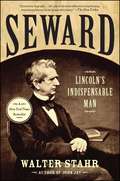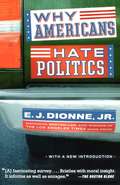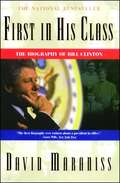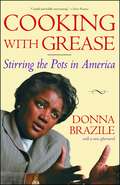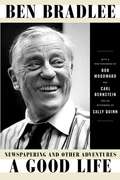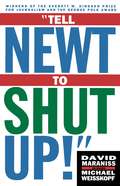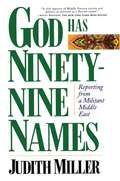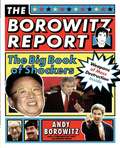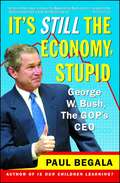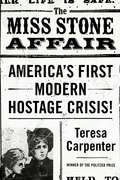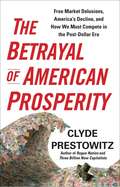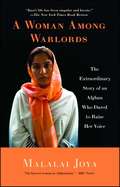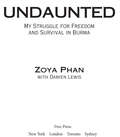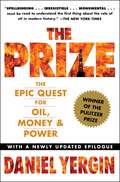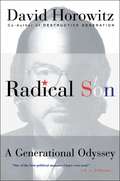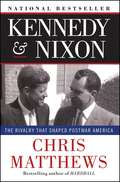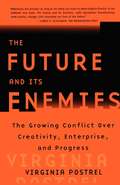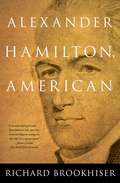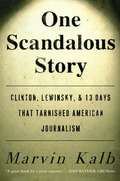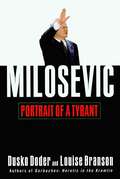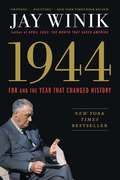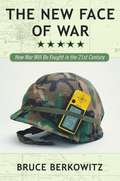- Table View
- List View
Seward: Lincoln's Indispensable Man
by Walter StahrFrom one of our most acclaimed new biographers– the first full life of the leader of Lincoln’s “team of rivals” to appear in more than forty years. William Henry Seward was one of the most important Americans of the nineteenth century. Progressive governor of New York and outspoken U.S. senator, he was the odds-on favorite to win the 1860 Republican nomination for president. As secretary of state and Lincoln’s closest adviser during the Civil War, Seward not only managed foreign affairs but had a substantial role in military, political, and personnel matters.Some of Lincoln’s critics even saw Seward, erroneously, as the power behind the throne; this is why John Wilkes Booth and his colleagues attempted to kill Seward as well as Lincoln. Seward survived the assassin’s attack, continued as secretary of state, and emerged as a staunch supporter of President Andrew Johnson, Lincoln’s controversial successor. Through his purchase of Alaska (“Seward’s Folly”), and his groundwork for the purchase of the Canal Zone and other territory, Seward set America on course to become a world empire.Seward was not only important, he was fascinating. Most nights this well-known raconteur with unruly hair and untidy clothes would gather diplomats, soldiers, politicians, or actors around his table to enjoy a cigar, a drink, and a good story. Drawing on hundreds of sources not available to or neglected by previous biographers, Walter Stahr sheds new light on this complex and central figure, as well as on pivotal events of the Civil War and its aftermath.
Why Americans Hate Politics
by E. J. Dionne Jr.In this new edition of his national bestseller, E. J. Dionne brings up to date his influential proposals for a politics that can and must find a balance between rights and obligations, between responsibility and compassion. From the New, Updated Introduction: "At the heart of Why Americans Hate Politics is the view that ideas shape politics far more than most accounts of public life usually allow. I believe ideas matter not only to elites and intellectuals, but also to rank and file voters. Indeed, I often think that the rank and file see the importance of ideas more clearly than the elites, who often find themselves surprised by the rise of the movements that arise from the bottom up and shape our politics."
First In His Class: A Biography Of Bill Clinton
by David MaranissWho exactly is Bill Clinton, and why was he, of all the brilliant and ambitious men in his generation, the first in his class to reach the White House?Drawing on hundreds of letters, documents, and interviews, David Maraniss explores the evolution of the personality of our forty-second president from his youth in Arkansas to his 1991 announcement that he would run for the nation's highest office. In this richly textured and balanced biography, Maraniss reveals a complex man full of great flaws and great talents. First in His Class is the definitive book on Bill Clinton.
Cooking with Grease: Stirring the Pots in American Politics
by Donna BrazileCooking with Grease is a powerful, behind-the-scenes memoir of the life and times of a tenacious political organizer and the first African-American woman to head a major presidential campaign.Donna Brazile fought her first political fight at age nine -- campaigning (successfully) for a city council candidate who promised a playground in her neighborhood. The day after Martin Luther King Jr. was assassinated, she committed her heart and her future to political and social activism. By the 2000 presidential election, Brazile had become a major player in American political history -- and she remains one of the most outspoken and forceful political activists of our day.Donna grew up one of nine children in a working-poor family in New Orleans, a place where talking politics comes as naturally as stirring a pot of seafood gumbo -- and where the two often go hand in hand. Growing up, Donna learned how to cook from watching her mother, Jean, stir the pots in their family kitchen. She inherited her love of reading and politics from her grandmother Frances. Her brothers Teddy Man and Chet worked as foot soldiers in her early business schemes and voter registration efforts.Cooking with Grease follows Donna's rise to greater and greater political and personal accomplishments: lobbying for student financial aide, organizing demonstrations to make Martin Luther King Jr.'s birthday a national holiday and working on the Jesse Jackson, Dick Gephardt, Michael Dukakis and Bill Clinton presidential campaigns. But each new career success came with its own kind of heartache, especially in her greatest challenge: leading Al Gore's 2000 campaign, making her the first African American to lead a major presidential campaign.Cooking with Grease is an intimate account of Donna's thirty years in politics. Her stories of the leaders and activists who have helped shape America's future are both inspiring and memorable. Donna's witty style and innovative political strategies have garnered her the respect and admiration of colleagues and adversaries alike -- she is as comfortable trading quips with J. C. Watts as she is with her Democratic colleagues. Her story is as warm and nourishing as a bowl of Brazile family gumbo.
A Good Life: Newspapering and Other Adventures
by Ben BradleeThis is the witty, candid story of a daring young man who made his own way to the heights of American journalism and public life, of the great adventure that took him at only twenty years old straight from Harvard to almost four years in the shooting war in the South Pacific, and back, from a maverick New Hampshire weekly to an apprenticeship for Newsweek in postwar Paris, then to the Washington Bureau chief's desk, and finally to the apex of his career at The Washington Post. <P> Bradlee took the helm of The Washington Post in 1965. He and his reporters transformed it into one of the most influential and respected news publications in the world, reinvented modern investigative journalism, and redefined the way news is reported, published, and read. Under his direction, the paper won eighteen Pulitzer prizes. His leadership and investigative drive following the break-in at the Democratic National Committee led to the downfall of a president, and kept every president afterward on his toes. Bradlee, backed every step of the way by the Graham family, challenged the federal government over the right to publish the Pentagon Papers - and won. His ingenuity, and the spirited reporting of Sally Quinn, now his wife, led to the creation of the Style Section, a revolutionary newspaper feature in its time, now copied by just about every paper in the country.
Tell Newt to Shut Up: Prize-winning Washington Post Journalists Reveal How Reality Gagged the Gingrich Revolution
by Michael Weisskopf David MaranissPRIZEWINNING WASHINGTON POST JOURNALISTS REVEAL HOW REALITY GAGGED THE GINGRICH REVOLUTION Speaker Newt Gingrich and his troops promised a revolution when they seized power in January 1995. The year that followed was one of the most fascinating and tumultuous in modern American history. After stunning early success with the Contract with America, the Republicans began to lose momentum; by year's end Gingrich was isolated and uncertain, and his closest allies were telling him to shut up. Here is an unprecedented, fly-on-the-wall look at the successes, sellouts, and perhaps fatal mistakes of Newt Gingrich's Republican Revolution. Based on the award-winning Washington Post series that documented the Republicans' day-to-day attempts to revolutionize the American government, "Tell Newt to Shut Up!" gets to the heart of the political process.
God Has Ninety-Nine Names
by Judith MillerA FIRST-HAND ACCOUNT OF THE STRUGGLE FOR POWER IN TODAY'S MIDDLE EAST God Has Ninety-Nine Names is a gripping, authoritative account of the epic battle between modernity and militant Islam that is is reshaping the Middle East. Judith Miller, a reporter who has covered the Middle east for twenty years, takes us inside the militant Islamic movements in ten countries: Egypt, Saudi Arabia, Sudan, Algeria, Libya, Lebanon, Syria, Jordan, Isreal and Iran. She shows that just as there is no unified Arab world, so there is no single Islam: The movements are as different as the countries in which they are rooted. Vivid and comprehensive, Miller's first-and report reveals the meaning of the tumultuous events that will continue to affect the prospects for Arab-Isreali peace and the potential for terrorism worlwide.
The Borowitz Report
by Andy BorowitzPrepare to be shocked. From the man The Wall Street Journal hailed as a "Swiftean satirist" comes the most shocking book ever written! The Borowitz Report: The Big Book of Shockers, by award-winning fake journalist Andy Borowitz, contains page after page of "news stories" too hot, too controversial, too -- yes, shocking -- for the mainstream press to handle. Sample the groundbreaking reporting from the news organization whose motto is "Give us thirty minutes -- we'll waste it."
God's Favorite: A Novel
by Lawrence WrightIn this fascinating work of historical fiction, Pulitzer Prize-winning author Lawrence Wright captures all the gripping drama and black humor of Panama during the final, nerve-racking days of its legendary dictator, Manuel Antonio Noriega.It is Christmas 1989, and Tony Noriega's demons are finally beginning to catch up with him. A former friend of President Bush, Fidel Castro, and Oliver North, this universally reviled strongman is on the run from the U.S. Congress, the Justice Department, the Colombian mob, and a host of political rivals. In his desperation, he seeks salvation from any and all quarters -- God, Satan, a voodoo priest, even the spirits of his murdered enemies. But with a million-dollar price on his head and 20,000 American soldiers on his trail, Noriega is fast running out of options. Drawn from a historical record more dramatic than even the most artful spy novel, God's Favorite is a riveting and darkly comic fictional account of the events that occurred in Panama from 1985 to the dictator's capture in 1989. With an award-winning journalist's eye for detail, Lawrence Wright leads the reader toward a dramatic face-off in the Vatican embassy, where Noriega confronts his psychological match in the papal nuncio.
It's Still the Economy, Stupid
by Paul BegalaWhen he took office in 2001, George W. Bush inherited the strongest economy in American history. He inherited the largest federal budget surplus in American history -- and the prospect of paying off the entire national debt in just eight years. He inherited a strong dollar and sound fiscal policy. He inherited a nation whose economy was so strong that commentators who just a decade before were predicting American decline were now complaining about American dominance. And yet, Dubya blew it. Squandered everything he'd inherited from President Clinton. We thought if Junior was good at anything, it was inheriting things. It's Still the Economy, Stupid is the story of how America's CEO -- our first MBA president -- has trashed our economy. It shows: How he wasted the surplus on massive tax cuts for the hyper-rich. How he talked down the economy for his short-term political gain, then passed an economic program that has put 1.8 million Americans out of work and cost investors $4.4 trillion. How he abandoned his free-trade rhetoric to adopt protectionist tariffs, effectively raising taxes on consumers. How he walked away from needed investments in education, training, and all the things that make us smarter, safer, and stronger economically. How he plans to go on from here to cripple Social Security and to allow the privileged to avoid even more taxes. It makes you wonder: What do they teach you at Harvard Business School?
The Miss Stone Affair: America's First Modern Hostage Crisis
by Teresa CarpenterA Simon & Schuster eBook. Simon & Schuster has a great book for every reader.
The Betrayal of American Prosperity
by Clyde PrestowitzCONSIDER THIS SHOCKING FACT: while China's number one export to the United States is $46 billion of computer equipment, the number one export from the U.S. to China is waste--$7.6 billion of waste paper and scrap metal. Bestselling author Clyde Prestowitz reveals the astonishing extent of the erosion of the fundamental pillars of American economic might--beginning well before the 2008 financial crisis--and the great challenge we face for the future in competing with the economic juggernaut of China and the other fast-rising economies. As the arresting facts he introduces show, the U.S. is rapidly losing the basis of its wealth and power, as well as its freedom of action and independence. If we do not make dramatic changes quickly, we will confront a painful permanent slide in our standard of living; the dollar will no longer be the world's currency; our military strength will be whittled away; and we will be increasingly subject to the will of China, Russia, Saudi Arabia, and various malcontents. But it doesn't have to be that way. As Prestowitz shows in a masterful account of how we've come to this fateful juncture, we have inflicted our economic decline on ourselves--we abandoned the extraordinary approach to growth that drove the country's remarkable rise to superpower status from the early days of the republic up through World War II. For most of our history, we supported our home industries, protected our market against unfair trade, made the world's finest products--leading the way in technological innovation--and we were strong savers. But in the post-WWII era, we reversed course as our leadership embraced a set of simplistically attractive but disastrously false ideas--that consumption rather than production should drive our economy; that free trade is always a win-win; that all globalization is good; that the market is always right and government regulation or intervention in the economy always causes more harm than good; and that it didn't matter that our factories were fleeing overseas because we were moving to the "higher ground" of services. In a devastating account, Prestowitz shows just how flawed this orthodoxy is and how it has gutted the American economy. The 2008 financial crisis was only its most blatant and recent consequence. It is time to abandon these false doctrines and to get back to the American way of growth that brought us to world leadership; Prestowitz presents a deeply researched and powerful set of highly practical steps that we can begin implementing immediately to reverse course and restore our economic leadership and excellence. The Betrayal of American Prosperity is vital reading for all Americans concerned about the future of the economy and of our power in the coming era.
A Proud Taste for Scarlet and Miniver (Yearling Book)
by E.L. KonigsburgEleanor of Acquitaine has been waiting in Heaven for a long time to be reunited with her second husband, Henry II of England. Finally, the day has come when Henry will be judged for admission--and while Eleanor waits, three people close to her during various times of her life join her, helping to distract her and providing a rich portrait of a remarkable woman in history.
A Woman Among Warlords: The Extraordinary Story of an Afghan Who Dared to Raise Her Voice
by Malalai JoyaMalalai Joya has been called "the bravest woman in Afghanistan." At a constitutional assembly in Kabul in 2003, she stood up and denounced her country's powerful NATO-backed warlords. She was twenty-five years old. Two years later, she became the youngest person elected to Afghanistan's new Parliament. In 2007, she was suspended from Parliament for her persistent criticism of the warlords and drug barons and their cronies. She has survived four assassination attempts to date, is accompanied at all times by armed guards, and sleeps only in safe houses. Often compared to democratic leaders such as Burma's Aung San Suu Kyi, this extraordinary young woman was raised in the refugee camps of Iran and Pakistan. Inspired in part by her father's activism, Malalai became a teacher in secret girls' schools, holding classes in a series of basements. She hid her books under her burqa so the Taliban couldn't find them. She also helped establish a free medical clinic and orphanage in her impoverished home province of Farah. The endless wars of Afghanistan have created a generation of children without parents. Like so many others who have lost people they care about, Malalai lost one of her orphans when the girl's family members sold her into marriage. While many have talked about the serious plight of women in Afghanistan, Malalai Joya takes us inside the country and shows us the desperate dayto-day situations these remarkable people face at every turn. She recounts some of the many acts of rebellion that are helping to change the country -- the women who bravely take to the streets in peaceful protest against their oppression; the men who step forward and claim "I am her mahram," so the fundamentalists won't punish a woman for walking alone; and the families that give their basements as classrooms for female students. A controversial political figure in one of the most dangerous places on earth, Malalai Joya is a hero for our times, a young woman who refused to be silent, a young woman committed to making a difference in the world, no matter the cost.
Undaunted: My Struggle for Freedom and Survival in Burma
by Zoya PhanOnce a royal kingdom and then part of the British Empire, Burma long held sway in the Western imagination as a mythic place of great beauty. In recent times, Burma has been torn apart and isolated by one of the most brutal dictatorships in the world. Now, Zoya, a young member of the Karen tribe in Burma, bravely comes forward with her astonishingly vivid story of growing up in the idyllic green mansions of the jungle, and her violent displacement by the military junta that has controlled the country for almost a half century. This same cadre has also relentlessly hunted Zoya and her family across borders and continents. Undaunted tells of Zoya's riveting adventures, from her unusual childhood in a fascinating remote culture, to her years on the run, to her emergence as an activist icon. Named for a courageous Russian freedom fighter of World War II, Zoya was fourteen when Burmese aircraft bombed her peaceful village, forcing her and her family to flee through the jungles to a refugee camp just over the border in Thailand. After being trapped in refugee camps for years in poverty and despair, her family scattered; as her father became more deeply involved in the struggle for freedom, Zoya and her sister left their mother in the camp to go to a college in Bangkok to which they had won scholarships. But even as she attended classes, Zoya, the girl from the jungle, had to dodge police and assume an urban disguise, as she was technically an illegal immigrant and subject to deportation. Although, following graduation, she obtained a comfortable job with a major communications company in Bangkok, Zoya felt called back to Burma to help her mother and her people, millions of whom still have to live on the run today in order to survive--in fact, more villages have been destroyed in eastern Burma than in Darfur, Sudan. After a plot to kill her was uncovered, in 2004 Zoya escaped to the United Kingdom, where she began speaking at political conferences and demonstrations--a mission made all the more vital by her father's assassination in 2008 by agents of the Burmese regime. Like Ayaan Hirsi Ali, Zoya has become a powerful spokesperson against oppressors, undaunted by dangers posed to her life.
The Prize: The Epic Quest for Oil, Money & Power
by Daniel YerginWinner of the Pulitzer Prize and hailed as &“the best history of oil ever written&” by Business Week, Daniel Yergin&’s &“spellbinding…irresistible&” (The New York Times) account of the global pursuit of oil, money, and power addresses the ongoing energy crisis. Now with an epilogue that speaks directly to the current energy crisis, The Prize recounts the panoramic history of the world&’s most important resource—oil. Daniel Yergin&’s timeless book chronicles the struggle for wealth and power that has surrounded oil for decades and that continues to fuel global rivalries, shake the world economy, and transform the destiny of men and nations. This updated edition categorically proves the unwavering significance of oil throughout the twentieth century and into the twenty-first by tracing economic and political clashes over precious &“black gold.&” With his far-reaching insight and in-depth research, Yergin is uniquely positioned to address the present battle over energy which undoubtedly ranks as one of the most vital issues of our time. The canvas of his narrative history is enormous—from the drilling of the first well in Pennsylvania through two great world wars to the Iraqi invasion of Kuwait, Operation Desert Storm, and both the Iraq War and current climate change. The definitive work on the subject of oil, The Prize is a book of extraordinary breadth, riveting excitement, and great value—crucial to our understanding of world politics and the economy today—and tomorrow.
Radical Son: A Generational Odyssey
by David HorowitzDavid Horowitz was one of the founders of the New Left and an editor of Ramparts, the magazine that set the intellectual and revolutionary tone for the movement. From his vantage point at the center of the action, he provides vivid portraits of people who made the radical decade: world-famous philosopher Bertrand Russell, who in his nineties became America's scourge, organizing a War Crimes Tribunal over the war in Vietnam; Tom Hayden, the radical Everyman who promoted guerrilla warfare in America's cities in the Sixties and became a Democratic state senator when his revolutions failed; and Huey Newton, a street hustler and murderer who founded the most celebrated radical group of the Sixties, the Black Panthers. A brutal murder committed by the Panthers prompted Horowitz's profound "second thoughts" that eventually transformed him into an intellectual leader of conservatism and its most prominent activist in Hollywood.
Radical Son: A Generational Oddysey
by David HorowitzOriginally a radical socialist, the current driving force behind the rise of the Hollywood right recounts how he moved from one set of political convictions to another over the course of thirty years, and challenges readers to consider how they came by their own convictions.
Kennedy & Nixon
by Christopher J MatthewsJohn F. Kennedy and Richard Nixon each dreamed of becoming the great young leader of their age. First as friends, then as bitter enemies, they were linked by a historic rivalry that changed both them and their country. In this startling dual portrait, Chris Matthews shows how the contest between the charismatic Kennedy and the talented yet haunted Nixon propelled America toward Vietnam and Watergate. Fresh, entertaining, and revealing, Kennedy and Nixon shows how the early fondness between the two men--Kennedy, for example, told a trusted friend that if he didn't receive the Democratic nomination in 1960, he would vote for Nixon--degenerated into distrust and bitterness. Using White House tapes, this book shows how Richard Nixon's dread of a Kennedy "restoration" in 1972 drove the dark deeds of Watergate.
The Future and Its Enemies: The Growing Conflict Over Creativity, Enterprise,
by Virginia PostrelToday we have greater wealth, health, opportunity, and choice than at any time in history. Yet a chorus of intellectuals and politicians laments our current condition -- as slaves to technology, coarsened by popular culture, and insecure in the face of economic change. The future, they tell us, is dangerously out of control, and unless we precisely govern the forces of change, we risk disaster.In The Future and Its Enemies, Virginia Postrel explodes the myths behind these claims. Using examples that range from medicine to fashion, she explores how progress truly occurs and demonstrates that human betterment depends not on conformity to one central vision but on creativity and decentralized, open-ended trial and error. She argues that these two opposing world-views -- "stasis" vs. "dynamism" -- are replacing "left" and "right" to define our cultural and political debate as we enter the next century.In this bold exploration of how civilizations learn, Postrel heralds a fundamental shift in the way we view politics, culture, technology, and society as we face an unknown -- and invigorating -- future.
Alexander Hamilton, American
by Richard BrookhiserAlexander Hamilton is one of the least understood, most important, and most impassioned and inspiring of the founding fathers. At last Hamilton has found a modern biographer who can bring him to full-blooded life; Richard Brookhiser. In these pages, Alexander Hamilton sheds his skewed image as the "bastard brat of a Scotch peddler," sex scandal survivor, and notoriously doomed dueling partner of Aaron Burr. Examined up close, throughout his meteoric and ever-fascinating (if tragically brief) life, Hamilton can at last be seen as one of the most crucial of the founders. Here, thanks to Brookhiser's accustomed wit and grace, this quintessential American lives again.
One Scandalous Story
by Marvin KalbIn 1963 Marvin Kalb observed the Secret Service escorting an attractive woman into a hotel for what was most likely a rendezvous with President Kennedy. Kalb, then a news correspondent for CBS, didn't consider the incident newsworthy. Thirty-five years later, Kalb watched in dismay as the press dove headfirst into the scandal of President Clinton's affair with White House intern Monica Lewinsky, disclosing every prurient detail. How and why had the journalistic landscape shifted so dramatically? One Scandalous Story seeks to answer this critical question through the inside story of thirteen days -- January 13-25, 1998 -- that make up a vital chapter in the history of American journalism. In riveting detail, Kalb examines just how the media covered the Lewinsky scandal, offering what he calls an "X-ray of the Washington press corps." Drawing on hundreds of original interviews, Kalb allows us to eavesdrop on the incestuous deals between reporters and sources, the bitter disagreements among editors, the machination of moguls for whom news is Big Business, and above all, the frantic maneuvering to break the story. With fresh insight, he retraces decisions made by Michael Isikoff of Newsweek, Internet renegade Matt Drudge, Jackie Judd of ABC, Clinton-basher Lucianne Goldberg, Susan Schmidt of The Washington Post, Jackie Bennett of the Office of the Independent Counsel, and other key players in this scandal that veered from low comedy to high drama. Through the lens of those thirteen turbulent days, Kalb offers us a portrait of the "new news" in all its contradictions. He reveals how intense economic pressures in the news business, the ascendancy of the Internet, the blurring of roles between reporters and commentators, and a surge of dubious sourcing and "copy-cat journalism" have combined to make tabloid-style journalism increasingly mainstream. But are we condemned to a resurgence of "yellow journalism"? Painstakingly documented and sobering in its conclusions, One Scandalous Story issues a clarion call to newsmakers and the American public alike: "Journalism can change for the better -- and must."
Milosevic
by Dusko Doder Louise BransonWho is Slobodan Milosevic? Is he the next Saddam Hussein, the leader of a renegade nation who will continue to torment the United States for years to come? Or is he the next Moammar Qaddafi, an international outcast silenced for good by a resolute American bombing campaign? The war in Kosovo in the spring of 1999 introduced many Americans to the man the newspapers have called "the butcher of the Balkans," but few understand the crucial role he has played and continues to play in the most troubled part of Europe. Directly or indirectly, Milosevic has waged war and instigated brutal ethnic cleansing in Croatia, Bosnia, and Kosovo, and he was indicted for war crimes in May 1999. Milosevic's rise to power, from lowly Serbian apparatchik to president of Yugoslavia, is a tale of intrigue, cynical manipulation, and deceit whose full dimensions have never been presented to the American public. In this first full-length biography of the Yugoslav leader, veteran foreign correspondents Dusko Doder and Louise Branson paint a disturbing portrait of a cunning politician who has not shied from fomenting wars and double-crossing enemies and allies alike in his ruthless pursuit of power. Whereas most dictators encourage a cult of personality around themselves, Milosevic has been content to operate in the shadows, shunning publicity and allowing others to grab the limelight -- and then to take the heat when things go badly. Milosevic's secretive style, the authors show, emerged in response to a family history of depression (both of his parents committed suicide) and has served him well as he begins his second decade in power. Doder and Branson introduce us to the key figures behind Milosevic's rise: his wife, Mirjana Markovic, who is often described (with justification) as a Serbian Lady Macbeth, and the Balkan and American politicians who learned, too late, about the costs of underestimating Milosevic. They also reveal how the United States refused to take the necessary action in 1992 to remove Milosevic from power without bloodshed -- not realizing that he uses such moments of weakness as opportunities to lull his opponents into traps, thereby paving the way for a new consolidation of power. Now, in the wake of the victory in Kosovo, it remains to be seen whether America will learn this lesson or whether we will allow this deeply troubled man to continue to pose a threat to European peace and security as the twenty-first century dawns.
1944
by Jay WinikNew York Times bestselling author Jay Winik brings to life in gripping detail the year 1944, which determined the outcome of World War II and put more pressure than any other on an ailing yet determined President Roosevelt.It was not inevitable that World War II would end as it did, or that it would even end well. 1944 was a year that could have stymied the Allies and cemented Hitler's waning power. Instead, it saved those democracies--but with a fateful cost. Now, in a superbly told story, Jay Winik, the acclaimed author of April 1865 and The Great Upheaval, captures the epic images and extraordinary history as never before. 1944 witnessed a series of titanic events: FDR at the pinnacle of his wartime leadership as well as his reelection, the planning of Operation Overlord with Churchill and Stalin, the unprecedented D-Day invasion, the liberation of Paris and the horrific Battle of the Bulge, and the tumultuous conferences that finally shaped the coming peace. But on the way, millions of more lives were still at stake as President Roosevelt was exposed to mounting evidence of the most grotesque crime in history, the Final Solution. Just as the Allies were landing in Normandy, the Nazis were accelerating the killing of millions of European Jews. Winik shows how escalating pressures fell on an all but dying Roosevelt, whose rapidly deteriorating health was a closely guarded secret. Here then, as with D-Day, was a momentous decision for the president. Was winning the war the best way to rescue the Jews? Was a rescue even possible? Or would it get in the way of defeating Hitler? In a year when even the most audacious undertakings were within the world's reach, including the liberation of Europe, one challenge--saving Europe's Jews--seemed to remain beyond Roosevelt's grasp. As he did so brilliantly in April 1865, Winik provides a stunningly fresh look at the twentieth century's most pivotal year. Magisterial, bold, and exquisitely rendered, 1944: FDR and the Year that Changed History is the first book to tell these events with such moral clarity and unprecedented sweep, and a moving appreciation of the extraordinary struggles of the era's outsized figures. 1944 is destined to take its place as one of the great works of World War II.
The New Face of War: How War Will Be Fought in the 21st Century
by Bruce D. BerkowitzAs American and coalition troops fight the first battles of this new century -- from Afghanistan to Yemen to the Philippines to Iraq -- they do so in ways never before seen. Until recently, information war was but one piece of a puzzle, more than a sideshow in war but far less than the sum total of the game. Today, however, we find information war revolutionizing combat, from top to bottom. Gone are the advantages of fortified positions -- nothing is impregnable any longer. Gone is the reason to create an overwhelming mass of troops -- now, troop concentrations merely present easier targets. Instead, stealth, swarming, and "zapping" (precision strikes on individuals or equipment) are the order of the day, based on superior information and lightning-fast decision-making. In many ways, modern warfare is information warfare. Bruce Berkowitz's explanation of how information war revolutionized combat and what it means for our soldiers could not be better timed. As Western forces wage war against terrorists and their supporters, in actions large and small, on several continents, The New Face of War explains how they fight and how they will win or lose. There are four key dynamics to the new warfare: asymmetric threats, in which even the strongest armies may suffer from at least one Achilles' heel; information-technology competition, in which advantages in computers and communications are crucial; the race of decision cycles, in which the first opponent to process and react to information effectively is almost certain to win; and network organization, in which fluid arrays of combat forces can spontaneously organize in multiple ways to fight any given opponent at any time. America's use of networked, elite ground forces, in combination with precision-guided bombing from manned and unmanned flyers, turned Afghanistan from a Soviet graveyard into a lopsided field of American victory. Yet we are not invulnerable, and the same technology that we used in Kuwait in 1991 is now available to anyone with a credit card and access to the Internet. Al Qaeda is adept in the new model of war, and has searched long and hard for weaknesses in our defenses. Will we be able to stay ahead of its thinking? In Iraq, Saddam's army is in no position to defeat its enemies -- but could it defend Baghdad? As the world anxiously considers these and other questions of modern war, Bruce Berkowitz offers many answers and a framework for understanding combat that will never again resemble the days of massive marches on fortress-like positions. The New Face of War is a crucial guidebook for reading the headlines from across our troubled planet.
